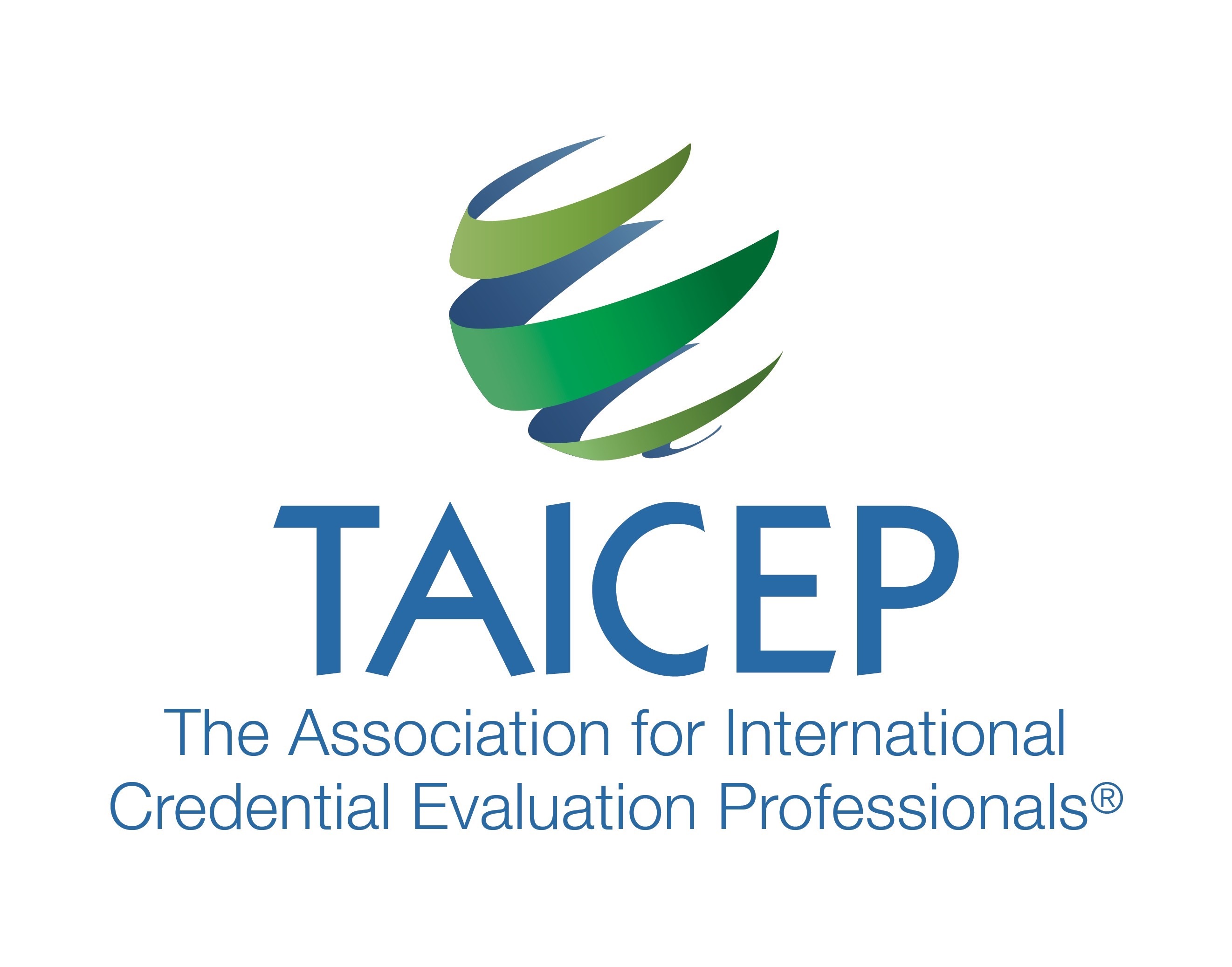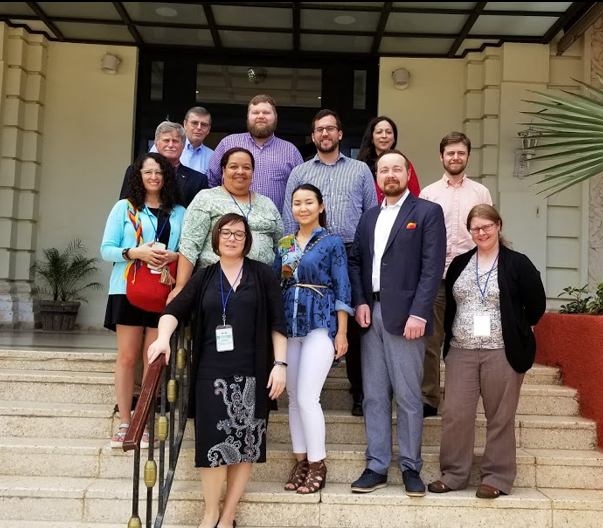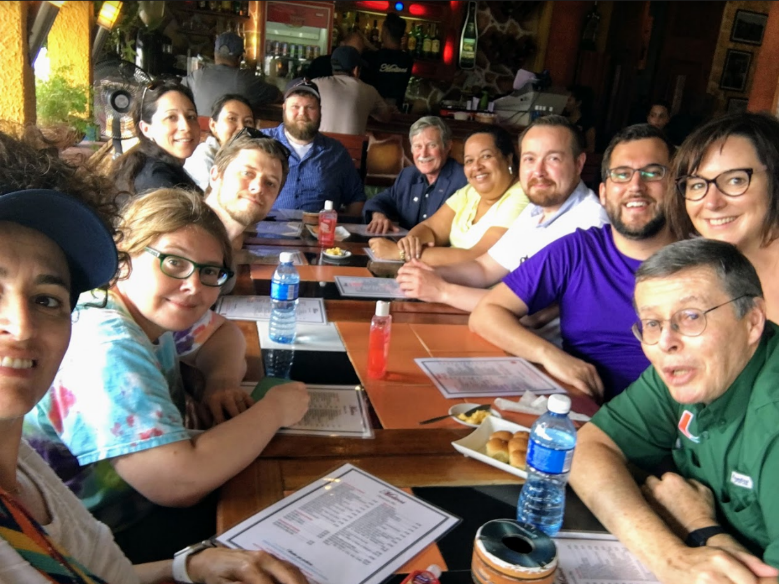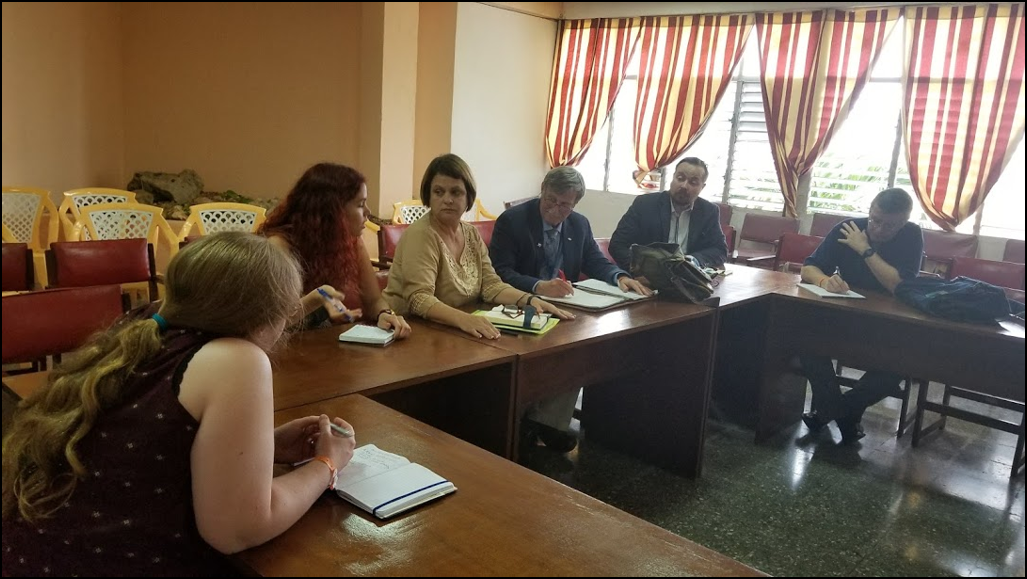Written by: Martha Van Devender, Senior Evaluator, Educational Credential Evaluators (ECE)
Last fall, AACRAO (The American Association of Collegiate Registrars and Admissions Officers) put out a call for applications to participate in a new type of professional development program. By using an innovative funding model and joining a pre-existing research program on Cuban education, a team of representatives from American universities and professional associations, with AACRAO Deputy Director Melanie Gottlieb serving as lead, would get a chance to travel to Cuba. While in country, they would visit educational institutions and learn more from expert representatives, most notably the Asociación de Pedagogos de Cuba (APC). The goals of the project included updating the Cuba profile in AACRAO EDGE (Electronic Database for Global Education), presenting the group’s findings, and developing a publication on the Cuban education system. It was an amazing opportunity and I heard about it after the group had been chosen. I was excited to see that several people I knew were going to be involved in the year-long project. What an adventure!
Fast-forward to mid-December and one of the group members had to withdraw. Luckily tickets had not been purchased yet! AACRAO approached TAICEP to see if they wanted to fill the slot from their membership. It was a great opportunity for the two organizations to collaborate and for TAICEP to have someone representing them, an organization dedicated to the credential evaluation profession, within the larger long-term research project. The only catch was the timeline. The trip was scheduled for February and Cuban visas are not the easiest thing to get. TAICEP leadership organized a new application process, which mimicked the initial round. But this time, you had to be a TAICEP member to apply. Emails went out to the membership on Monday morning, but the applications, along with letters of support from their organizations, were due before the end of the week. It was a tight turn around, especially for the week before the winter holidays.
Having already reviewed the website with the list of participants, I had an advantage at my company. I already knew the qualifications. And I knew I was a decent fit. I had plenty of professional experience in the field. My passport was valid and I had traveled in Latin America before. I had a working knowledge of Spanish and a passing understanding of the Cuban educational system already. And I’m a research maniac. So I was the first person to approach management and they agreed that I was a qualified candidate to represent ECE (Educational Credential Evaluators) in the application process. They were willing to support me, if I was chosen. We were able to compile the paperwork and I got the application in as I was leaving for vacation. Christmas came early for me when I found out, just days after the deadline, that I had been selected as the twelfth member of the team. I submitted the visa forms, ordered a plane ticket, and started learning as much as possible as I could about Cuba. I wanted to be able to contribute, once we started doing research and especially once we arrived in country.
Now I need to take a second to backtrack here. I already mentioned that the AACRAO group was partnering with another research program to facilitate access. But I need to give a little background. For the past 24 years, the Búsquedas Investigativas (Academic Explorations) team has brought US higher educational professionals and graduate students to Cuba to meet with Cuban counterparts to explore different facets of their educational system. Doesn’t that sound like the perfect opportunity to do some in-depth research on the educational system in Cuba? The alignment of missions was perfect. It was so perfect that it only happened by chance, when Melanie met the coordinator for the Búsquedas team at a party. Our trip was pre-ordained by fate. Credential evaluators do count as higher education professionals, so we were welcomed among the larger group. All told, we had over 50 representatives from the United States in our contingent. When we were traveling in country with our new Cuban colleagues, we had nearly 80 people. It was a little overwhelming when we finally arrived and were able to meet for the first time. I know I clung to our AACRAO subgroup for the first few days just because there were so many people. But that probably helped us gel as a group too. After all, our responsibilities will extend far after we come back from Havana and we need to be able to work together.
Luckily, the AACRAO Dozen, the name I gave us after the fact, was a wonderful group of people. We only had a few phone calls before the trip to try to plan and think about our research goals in a constructive manner. Before we left for Cuba, we tried to divvy up aspects of the education system to focus on when we arrived, so that we would have subject breadth and different people would go on different site visits. But everyone seemed excited and we certainly acted like old friends once we arrived in Havana. We had our first meeting, next to the pool with some Cuban cocktails, the first afternoon in country. And we spent our first bit of free time going on a bus tour around the city together. Even though we were there as professionals, the vibe of being around so many students wore off on me. With the group meals, cultural explorations, and tiring schedule, it felt just like a study abroad experience. I even had a roommate! I enjoyed spending time with each one of them, getting to know little details like how Christie had visited my hometown or Mark’s wife is from the city in Colombia where my sister had been living. I can’t wait to begin work on the research and writing phase of our project, so I get to spend more time with them.
One of our mantras in Cuba was “be flexible”. Our meetings were all prearranged. So the questions we had about university curricula and reforms were not appropriate when visiting a special education school. The medical school we visited was for international students, so we did not get a chance to see how Cuban medical professionals are educated. We did not get to meet with any ministerial staff. One of our Cuban friends realized we had very specific research needs and arranged for a small group of us to meet with Rector and Secretary General of the University of Matanzas. We were finally able to ask the right people the right sorts of questions, but the ad hoc nature of the meeting meant we couldn’t review documents together or follow-up on some of the things they mentioned. We will be sure to contact them again. It turns out the Secretary General is the key to any documentation issues on Cuban university campuses, so any correspondence you send should be directed to them. So we were being flexible and trying to learn from every new person we met. But I know I came back from Cuba with more questions that I had when I arrived.
We compiled our notes once we returned, but twelve versions of the same educational session, that was geared towards the graduate students in the first place, may not be helpful terms of research. Out first conference session, given at the national AACRAO meeting this spring, with half of the group participating, was a good start at actually seeing what we had learned. Preparing for our session showed me that we already have a lot of resources about Cuba. But they are in our evaluation files and in the samples we save. We have to suss out the relevant information. We have already discovered contradictions between what our hosts at the Escuela Latinoamericana de Medicina (ELAM) told us and what we are seeing in their documentation. And, frankly, that is exciting. We felt like there was a dearth of information about the Cuban educational system. But that’s not true. We all have pieces of the puzzle sitting in our offices or document repositories. The trip to Cuba just gave us the ability to elucidate our questions more clearly, to know how much we know already, and to know what we need to do to learn more. For example, I think a timeline of the responsible parties at the major universities, like the secretaria general, decano, and rector, along with samples of their signatures, could be very beneficial. The same is true for a list of the MINREX (Ministerio de Relaciones Exteriores) staff that stamp and sign the official certified documents. And that is something I could prepare from the ECE archives. The other thing I realized it that there are resources on the Cuban educational system. But they are in Spanish. We will need to brush up on our translation skills.
When we first got back from Cuba, I was worried that we had not met with the right people and that what we learned was insignificant. After preparing the slides for our first educational session, I felt better. We did learn a great deal and we will be able to use that foundational knowledge to learn more going forward. Now I am focused on how to best represent TAICEP as part of the ongoing research project. I helped coordinate our first presentation. And we also submitted proposals for the TAICEP conference, so we are going to have two sessions on Cuba this fall in Philadelphia, one on secondary education and the other on post-secondary education. Luckily, I was not the only TAICEP member to go to Cuba. Several of us are involved in the organization. Even though I may be the TAICEP representative in the group, we all agree that sharing information with the TAICEP membership is essential. So I am focused on trying to get the members of the AACRAO Dozen to be more actively involved with TAICEP, such as writing articles for the newsletter or attending/presenting at the annual meeting. I hope you, the TAICEP members, appreciate our efforts. If you want to share anything about Cuba or their educational system, even questions you may have, then please let one of us know. We are happy to talk about it. And we are looking forward to continuing our research in the next year.
AACRAO, together with TAICEP, is working to support research efforts in international education. The Cuba research team is the first new project, but there is more to come. Or perhaps you have an idea for a research project and just need a little money to make it happen. Whether you want to support these efforts or engage on your own, please visit their website for more information regarding the Nathanson Fund and other grant programs.
Gloria R. Nathanson Fund for Research in International Education
http://www.aacrao.org/aacrao-solutions/aacrao-international/research-grants
In this Edition:
Organizational Updates -May 2018 Newsletter
Member Spotlight: Grant Adams A New Home in Credential Evaluation -May 2018 Newsletter
EQPR Project -May 2018 Newsletter
Building a Resource Library Part IV: Translations -May 2018 Newsletter



